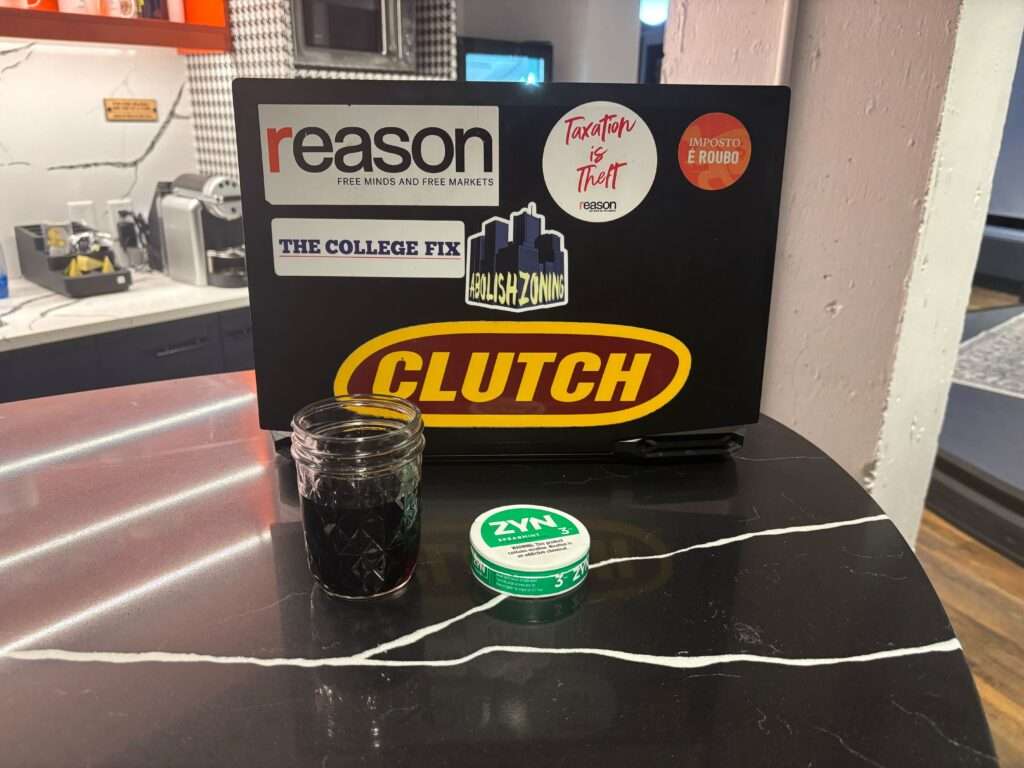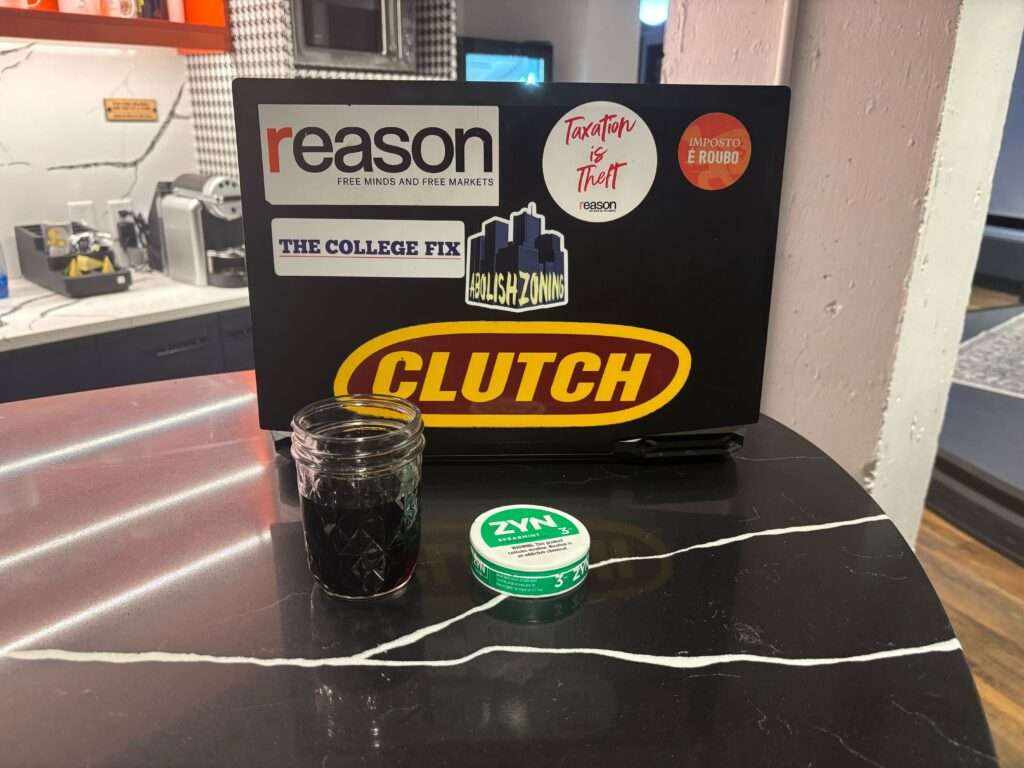Let freedom ryng: On Thursday, the Food and Drug Administration (FDA) authorized the marketing of 20 Zyn nicotine pouch products, allowing them to be legally sold by tobacco retailers nationwide (barring any additional state and local restrictions).
Fellow Zyn users might find the news that the sale of their daily fix is now officially legal somewhat surprising given that it’s already readily available at almost every gas station and tobacconist in America.
The fact is that the sellers of Zyn and countless other nicotine pouches, vape products, and other tobacco substitutes, have been operating in a darkly shaded gray regulatory environment for years.
The 2009 Family Smoking Prevention and Tobacco Control Act requires that “new tobacco products” not on the market as of 2007 receive “pre-market product authorization” from the FDA before they can be legally sold.
That requirement effectively meant that all vapes, heated tobacco products, nicotine pouches, and other new substitutes for traditional combustible cigarettes and cigars needed the agency’s approval before they were legally allowed to be sold.
Much to the chagrin of both the sellers of these products and anti-nicotine groups, the FDA has been exceedingly slow at creating a regulatory process for granting that pre-market authorization.
The FDA’s foot-dragging eventually prompted a lawsuit from anti-nicotine groups, which in turn promoted federal courts to set some deadlines. New tobacco product makers had to submit pre-market authorization applications to the FDA by September 2020 and those products needed to receive that authorization by September 2021 in order to be sold legally.
Receiving the FDA’s pre-market authorization turned out to be a high bar. Companies hoping to sell their innovative, stimulative, flavorful wares must show to the agency’s satisfaction that the legal availability of their product makes people less likely to consume tobacco products they’re currently using, without encouraging non-users to start.
Individual flavors and nicotine levels also require separate FDA approvals. (The 20 Zyn products approved by the agency yesterday cover ten of the brand’s flavors offered in the three- and six-milligram nicotine doses.)
The result was that the September 2021 deadline came and went without the agency granting pre-market authorization to almost all manufacturers who’d applied for it.
At the same time, the agency had not explicitly denied the vast majority of those applications either.
This left Zyn, Juul, and your local vape shop in the uncomfortable position of selling products that lacked explicit legal FDA approval but had yet to be explicitly denied that approval by the agency.
It’s only been the agency’s lack of resources and discretion that’s stopped every non-authorized product from being pulled from store shelves and sellers hit with heavy fines.
Republicans in Congress have pointed out the absurdity of the current regulatory environment where illegal vape products are being sold just miles from the FDA’s own headquarters.
Yesterday’s decision by the FDA will allow the makers of Zyn (Phillip Morris International subsidiary Swedish Match) to sleep more soundly at night—provided they haven’t consumed too much of their own product right before bedtime.
Tik as I do, not as I tok: Speaking of bans that the federal government lacks the balls will to enforce, outgoing President Joe Biden said Thursday evening that his administration does not intend to act on an effective ban of the social media app TikTok.
In April, Biden had signed into law a bill requiring that TikTok’s Chinese owner ByteDance sell the company. If they didn’t, American app stores and internet service providers could face fines for allowing access to the app.
The deadline for compliance is Sunday. ByteDance has yet to sell its massively popular app and TikTok has a challenge of the forced divestiture of its parent company pending at the Supreme Court (which appears likely to rule against the company).
That law gives the federal government some very limited leeway in delaying enforcement of the effective ban on TikTok. Per ABC News, the company must show that “it’s on a ‘path to executing’ a divesture from its Chinese owner; there must be ‘evidence of significant progress’ toward a sale; and that progress must be sealed with ‘relevant binding legal agreements.'”
TikTok has not met those requirements. Nevertheless, the Biden administration said it won’t seek to enforce the new law on its last day in office.
President-elect Donald Trump has promised to “save” the app from Congress’ effective ban. TikTok’s CEO will attend a Trump victory rally this weekend in Washington, D.C.
Even some lawmakers who voted for legislation that included the forced ByteDance sale of the app appear to be having second thoughts.
Sen. Ed Markey (D–Mass.) has said he’ll introduce a bill to delay the deadline for ByteDance’s sale of TikTok. The senator, and a few others who voted for the effective TikTok ban, still reportedly use the app.
A list of the people who voted YES on the Tiktok ban, who coincidently still use Tiktok.@CoryBooker @SenSherrodBrown @SenBobCasey @JohnFetterman @gillibrandny @SenMarkey @PattyMurray @SenOssoff @SenatorWarnock @JeffJacksonNC
Tell us again how dangerous it is for…
— Jo Jorgensen (@JoForLiberty) January 15, 2025
Do as I say, not as I do, apparently.
He taketh a drag away: Even as the Biden administration legalizes one nicotine product, it proposes the prohibition on another. On Wednesday, the White House produced harsh reductions in the amount of nicotine that would be allowed in conventional cigarettes.
The proposed levels would amount to an effective ban on the current cigarettes on the market. As Reason‘s Jacob Sullum writes:
The FDA’s proposed rule covers cigarette tobacco, pipe tobacco (except shisha for waterpipes), and cigars (except for “premium” cigars). All of those products would be limited to 0.7 milligrams of nicotine per gram of tobacco. That cap technically complies with a federal law that bars the FDA from banning tobacco products or “requiring the reduction of nicotine yields of a tobacco product to zero.” But the negligible amount of nicotine allowed under the rule would amount to both in practice.
Sullum reports that the first Trump administration considered a similar policy, but abandoned it after consideration of the likely fact that smokers would inhale more deeply and more often in an attempt to consume the same amount of nicotine.
In its last few days, the Biden administration seems less concerned with such petty, practical concerns.
Scenes from D.C.: To celebrate the newly official legal status of Zyn, I popped into a local retailer to buy a fresh tin of the stuff. As it happens, they were offering many of Zyn’s FDA-approved robust flavors—all of which are technically illegal to sell under the District’s flavored “tobacco” ban.

It felt a little dirty to walk away with a few of the brand’s spearmint-flavored pouches. Any of the guilt I felt about the illegality of the purchase was assuaged by the fact that the “smooth” and “cool” Zyn cans I had been buying previously (to say nothing of even more affordable on! pouches) were just as illegal. A pouch (and a glass of wine) helped me complete this newsletter on time (and in good spirits) for the morning editor.
QUICK HITS
- Are you seeing red? Well, neither am I. The FDA has banned Red Dye No. 3. We’ll see how well this agency prohibition sticks.
- Is there a spiritual case for acquiring Greenland? Politico has the scoop.
- The FBI is no longer DEI.
- Israel and Hamas appear on track for a ceasefire.
- Trump is ready to bypass Congress on the border and tariffs, reports The Wall Street Journal. Let’s hope he doesn’t think of a third thing to abuse his executive authority over.
- Biden issues a lot of last-minute executive orders. Can Trump undo them?
The post Let Freedom Zyn appeared first on Reason.com.







